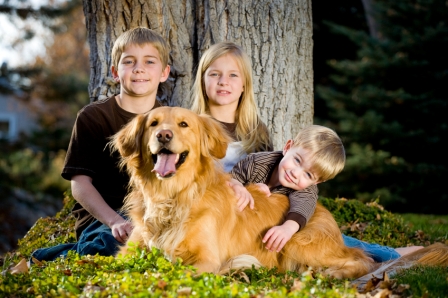Thinking
of getting a dog? You know your child wants a dog to play with but
did you know that the love and companionship of a dog can have long
lasting effects going far beyond their ability to entertain?
There’s no doubt dogs are
great companions for children − they provide unconditional love and
in many cases, a whole lot of laughs. But when it comes to children,
man’s best friend offers much more than simple friendship:
- Research has shown that children who spend time with dogs benefit both physically and emotionally.
- The current research into dog assisted therapy has turned the humble pet dog into an emotional, educational and physical resource. Everything from autism to reading ability has been tested with the use of therapy dogs. Excellent programs exist that have demonstrated a link between the interaction with dogs and improved social skills. This is mainly because a child who learns to care lovingly and patiently for an animal learns to treat people the same way.
- Scientists have found that if you grow up with a dog in the household you’re less likely to develop asthma and allergies later in life. Perhaps even more importantly, children with dogs are less likely to become overweight or obese.
- Owning a dog can also increase a child’s self-confidence and self-esteem and help prepare them for real-life scenarios such as illness and even death. Dogs have the capacity to be great friends and they’re a lot of fun. They also boost morale and can teach children responsibility and respect for other living things. Those are all important life skills.
- Anyone who has owned a dog can attest to the relaxing effects of owning a pet. Studies have shown that petting an animal can reduce anxiety and tension. The companionship of a dog can also help children build self-esteem and ease social interactions.
- Dogs provide non-judgmental company and unwavering loyalty. To young children facing a world in which they are struggling to find their place a dog can help them develop a sense of themselves while also decreasing feelings of loneliness and encouraging empathy.
- Dogs demand a certain amount of physical play and care. Children may be more motivated to be physically active when they are with a dog than without.
The loss of a dog
Losing your best friend can be
devastating, particularly for children and teenagers, but there are
ways to soften the impact, if only a little. The first step is to be
completely honest. If their pet is ill or nearing the end of its
life, it’s best to be upfront and let your kids know. The same goes
for when the pet does pass away. It’s important to be honest with
children to avoid confusion, the loss of a pet is often the first
experience a child has with death and how this situation is handled
can impact on their future understanding of the dying process.
It’s also advisable to give
your children the opportunity to grieve fully, even if they are very
young. Let them ask questions and encourage them to talk as freely as
possible about their pet and everything they loved about him or her.
They may even like to draw pictures or place a framed photograph in a
special place. If you're thinking about getting a new pet, at a short
notice, a good place to start is on the RSPCA's rehoming website. You can
search for the perfect pet from the hundreds of abandoned animals who
are looking for a nice family to give them a home. The website also
provides plenty of information on how to choose the right pet to suit
you and your family.
Having
a devoted dog in the home can contribute to a parent's efforts to
raise their child into a caring and balanced adult.
____________________________________________________


No comments :
Post a Comment